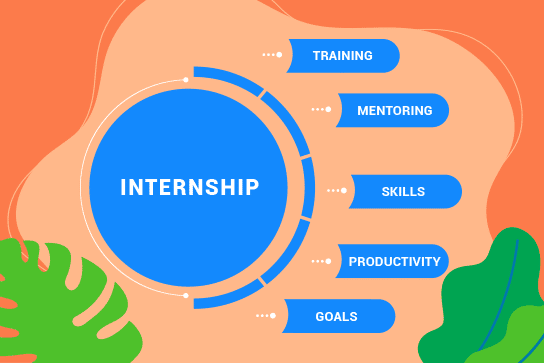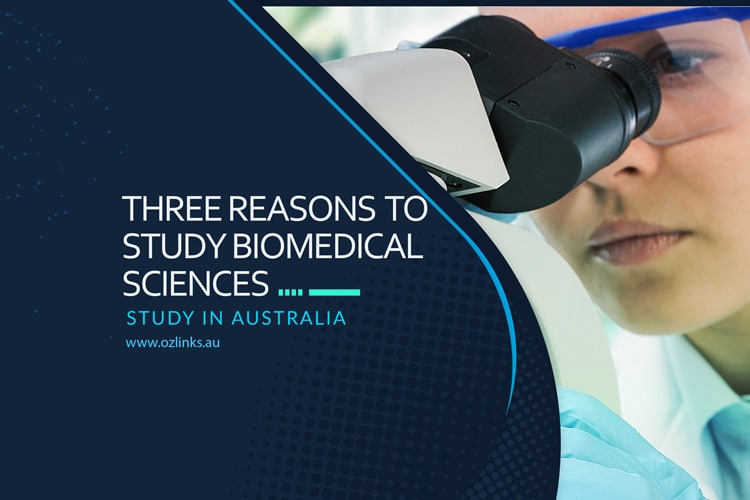LISTEN AUDIO
Last Updated on July 28, 2025 by Ozlinks Education
Three reasons to study Biomedical Sciences
Biomedical science (or biomedicine) is the study of biology and chemistry, the two major fields that comprise the natural sciences, as they relate to healthcare. The biomedical sciences are the foundation of medicine, without a thorough understanding of how the body functions on the inside, doctors and nurses cannot effectively diagnose and treat illnesses. Those interested in a career in biomedical science should expect to spend the majority of their time in a laboratory or conducting research and studying the human body with the ultimate goal of advancing medical knowledge.
Because this field of study is so broad, its graduates have numerous options for specialising in their studies. This academic field places a high value on how it can be applied in the real world. Biomedical scientists are constantly in the news for their ground-breaking discoveries and how they improve people’s lives. As a biomedical scientist, you could be working on 3D printed heart, developing a new cancer drug, or creating embryos for in vitro fertilisation (IVF).
The field of biomedical sciences has a lot to offer, so why not check it out? Here are three (3) benefits of majoring in this area that may help you decide if this is the right course for you.
1-A good plan for a professional life
The field of medicine is extremely broad, and the human body is comprised of an incredible number of distinct organ systems. Students studying biomedical sciences have a wide variety of options for specialising in their studies. You have the option of majoring in subjects such as anatomy, biochemistry, blood tests, blood transfusions, cell biology, clinical microbiology, genetic screening, genetics, haematology, histology, histopathology, immunity, immunodeficiency, immunology, infection, molecular biology, parasitology, stem cell, transplantation.
Therefore, Biomedical Science degree is a qualification that is highly sought after since there is a demand for biomedical scientists in a variety of fields, and the skills that are acquired are highly transferrable. This could be the right degree for you if you have an interest in the science of medicine but do not necessarily want to pursue a career in the medical field, then a biomedical science is a good option.
2- Make a real difference in people’s health.
When we talk about medicine, we mean the study of health and healing. This group includes medical doctors, physicians, nurses, support staff, paramedics, pharmacists, physiotherapists, and a variety of other specialists. Doctors evaluate and manage your medical treatment, nurses provide ongoing care, allied health professionals assist in the diagnosis, treatment, and recovery of patients.
Biomedical scientists are at the forefront of several important fields, such as medical advancement, disease cure discovery, and environmental research, and their work in the health sector contributes significantly to human health on a daily basis. Graduates of biomedical science make significant contributions to human health, and your specialisations will enable you to work in a wide range of health-related fields, from investigation to diagnosis and treatment.
3- Possibilities for a future career
Biomedical science will prepare you for a wide range of rewarding careers in which you will be able to positively impact people’s health. Graduates of biomedical science can find employment in a wide range of fields, including medicine, biotechnology, the pharmaceutical industry, health policy, government and non-government organisations, laboratories, and research institutes, and so on. You might be considered in adding an honours year to your study plan as a steppingstone to a successful career in biomedical research.
Why should you study biomedical sciences in Australia?
International students interested in pursuing a career in the ever-changing field of biomedicine should consider studying biomedicine in Australia. What students may expect from biomedical degrees in Australia, as well as the innovations driving the future of healthcare in Australia.
The Bachelor of Biomedicine course prepares future generations of biomedical professionals to lead the medical revolution. This course will provide students with an in-depth understanding of how the body works at the cellular level, what causes disease, and laboratory disease detection procedures, including the growing field of diagnostic tools based on molecules. This could be the driving force behind your decision to attend one of the top universities in Australia.
Bachelor of Biomedicine at Melbourne University
The process of choosing a university is not simple. You’ve made the first step towards a prosperous future by enrolling at Monash University. Many different types of graduate study are available in the health care field for those with a bachelor’s degree in biomedical science, and graduates can pursue careers in biotechnology, pharmaceuticals, research, product development, and technology. Do you need help on course enrolment? Contact Us
Watch the presentation on biomedical science.
Bachelor of Biomedical Science at University of Queensland
At the University of Queensland, they can teach you to see opportunities where others do not and to view the world differently. Discover the most cutting-edge, globally relevant biomedical practises and acquire the theoretical and practical skills necessary for a dynamic profession in contemporary medical science. Do you need help on course enrolment? Contact Us
What it’s like to study biomedical science at UQ
List of Universities offering a Bachelor of Biomedical Science
The universities in Australia which offer Bachelor of Biomedical Science course are listed below.
Victoria University: Bachelor of Biomedical Science
The University of Melbourne: Bachelor of Biomedicine
RMIT University: Bachelor of Biomedical Science
Deakin University: Bachelor of Biomedical Science
The University of Western Australia: Bachelor of Biomedical Science
What does a medical laboratory scientist do?
Scientists in the field of biomedicine work to improve our capacity to detect, cure, and prevent human illness. They research the human body to learn how it functions and then use that information to develop novel treatments for illness. A typical day for a biomedical scientist involves conducting tests and analysing material using high-tech lab equipment and computers.
Medical Laboratory Scientist may also examine cultured samples, determine blood types, guarantee reliable record-keeping, and interpret findings. They might also investigate chronic diseases like cancer and diabetes or work to improve our ability to detect and treat new diseases as they emerge.
Their job involves:
- preparing tissue sections for microscopic examination
- examining and analysing samples to study the effects of microbial infections
- analysing samples of body tissue and fluids to develop techniques to aid in the diagnosis and treatment of diseases
- advising Medical Practitioners on the interpretation of tests and methods for use in the diagnosis and treatment of disease
- setting up the steps and rules of laboratory medical testing
- operating and maintaining laboratory equipment
- maintaining laboratory quality assurance and safety standards
- preparing scientific papers and reports
How to migrate to Australia as a Medical Laboratory Scientist
If you are an international student or migrant with a Biomedical Science degree, you can migrate to Australia under the occupation ANZSCO: 234611 Medical Laboratory Scientist, as the occupation is listed on the Medium Long Term Strategic Skills List (MLTSSL) and the Skilled Occupation List (SOL). The MLTSSL is a list of high-demand occupations defined by the Departments of Education and Training and Home Affairs Australia.
For more information about the potential visa pathways for medical laboratory scientists, visit ANZSCO: 234611.
Skill Assessment for Migration
To apply for skilled migration visas, you need to have apply for the skill assessment from the assessing authority in Australia. There are three skill assessment pathways; each pathway in particular has its own set of requirements.
AIMS Accredited Degree
International students and applicants who have completed an AIMS accredited program will be categorised as Medical Laboratory Scientist.
Acceptable Science Degree
Applicants without an AIMS accredited degree will be assessed in two stages:
Stage 1: consist of a document assessment.
Stage 2: consist of a written examination (the AIMS Medical Laboratory Scientist Professional Examination).
Postgraduate studies with medical laboratory experience
Applicants who do not hold an AIMS accredited degree, or who do not have a degree/s with subjects that meet the AIMS minimum requirement for an acceptable science degree, or meet the criteria of being relevant to pathology, may be assessed as a Medical Laboratory Scientist if their qualifications and skills satisfy the following requirements.
Applicants will be assessed in two stages:
Stage 1: consist of a document assessment, and
Stage 2: consist of a written examination (the AIMS Medical Laboratory Scientist Special Professional Examination).
If you need help with the skill assessments for the ANZSCO: 234611 Medical Laboratory Scientist, we can help you. Get in touch with Ozlinks Education.
Disclaimer:
This section does not intend to provide immigration assistance pursuant to section 276 of Migration Act (Cth) 1994 as described in the Migration laws. It is based on public guidelines available at Department of Home Affairs’ Website. It is your responsibility to verify accuracy and status of provided information with your Registered Migration Agent (RMA) who is bound by the MARA code of conduct before submitting any visa applications.
Although every effort has been made to provide complete and accurate information, Ozlinks Education and Career Services makes no warranties, express or implied, or representations as to the accuracy of content under ANZSCO Occupations sections.




